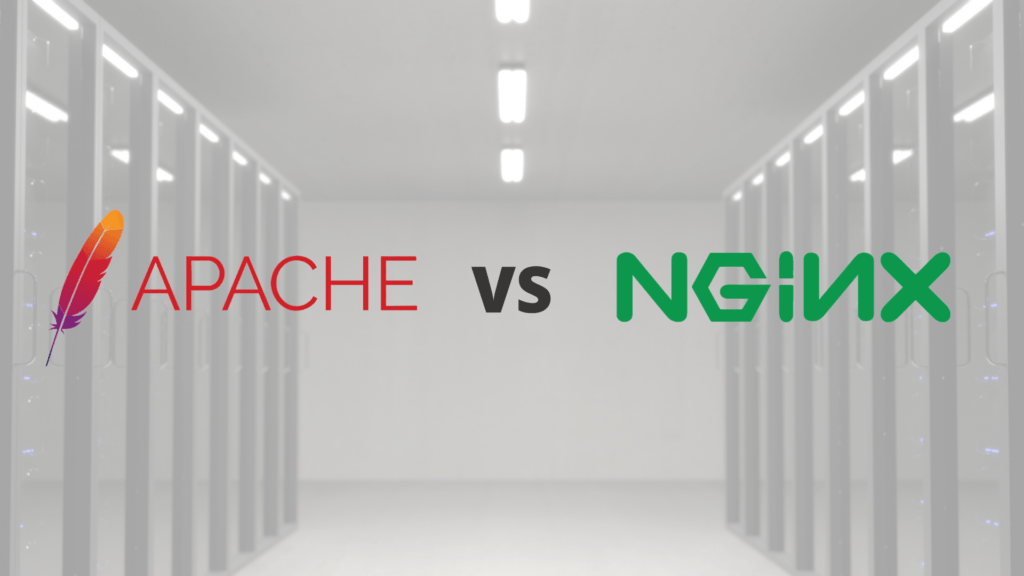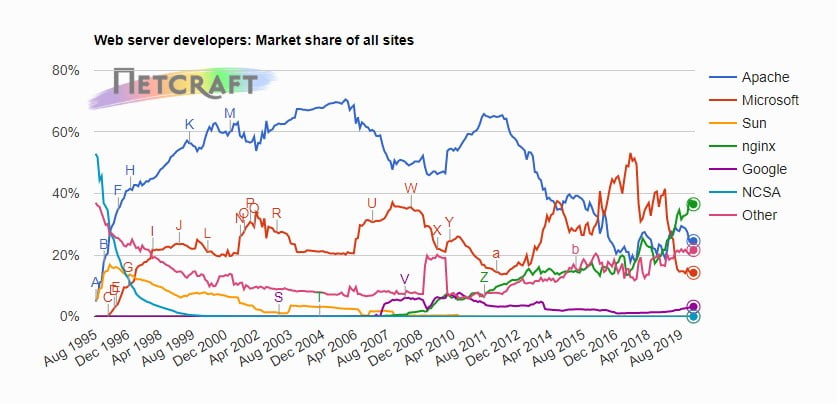
Finding the best performing and most reliable web server is at the cornerstone of any successful online business. So today, we are going to help with a detailed comparison of two of the market leaders – Nginx vs Apache.
The following review includes essential information, such as:
- What is Apache?
- What is Nginx?
- So which one scores better in the head-to-head comparison?
- Final Takes
- FAQ
What is Apache?

Apache is the server component of the LAMP stack (Linux, Apache, MySQL, and PHP), the prominent open-source software set for building web applications and various kinds of websites.
Apache servers utilize Multi Processing Modules (MPMs), which allow it to run in three different modes:
• Process – not very scalable, good for smaller websites
• Worker – utilizes a network of threads, scales better, but not suited for high-traffic websites
• Event – efficiently handles longer connections, the default setting of most Apache-run servers
The platform packs a rich set of features. Things like load balancing, reverse proxy caching, and bandwidth throttling are a few of the best-liked features by web developers and server admins worldwide.
What is Nginx?

Nginx arrived at the stage relatively late, almost ten years after Apache, but quickly took the market by storm. So much so, that it hosts close to 500 million websites today.
Some say that the Nginx web server was developed with the sole reason to outperform Apache. In reality, it was the proposed solution of the C10k problem – How can a web server handle 10,000 simultaneous connections?
Nginx relies on an asynchronous architecture to do the job – instead of threads, here we have s system that monitors, detects, and analyzes events. Based on these events, it applies predictive measures to handle the load.
In layman’s terms, you have a platform that uses its resources much more efficiently, and in tune with the current traffic consumption.
So which one scores better in the head-to-head comparison?
Have a look at the test results:
Popularity – winner: Nginx

source: Netcraft
Let’s take a trip down Memory Lane and check how the web server market looked twenty years ago:
• Apache – 60%
• Microsoft – 27%
• Sun Technologies – 3%
Nginx stepped into the stage around 2007. At that time, Apache was still sitting comfortably on top, with a 49% market share. Still, the Nginx developers wasted no time. The constant strive for innovation and product optimization impressed a lot of people, and clients soon started flooding in. Sun, Google, Microsoft –all the popular web servers lagged behind and were eventually bypassed by Nginx.
Apache’s lead was also shaky up until November 2018. According to the web survey reports, this is when Nginx finally took the top spot. So today, the popularity contest looks much more different than before:
• Nginx – 36%
• Apache – 25%
• Microsoft – 14%
To be fair, Apache servers still host more active websites than Nginx, but the trend shows its only a matter of time before that changes as well.
Performance (Static Content) – winner: Nginx
If you take a look at the best ranking and most popular websites, you will find (at least) one common denominator – they load super fast. Site speed is detrimental nowadays, and every second spent in waiting equals lost visitors and fewer sales.
Nginx performs almost two times faster for static content than Apache with 512 concurrent connections and 2.4 times faster with double the requests. At the same time, the RAM consumption is lower – in order to handle the load, Nginx used 5-6% less system memory.
This difference comes mainly from the server architecture.
Nginx doesn’t require any connection to the PHP when serving static files. This makes the request much lighter and easier to process.
Nginx is the clear winner here, but bear one thing in mind – these performance results are for static-only pages. Nowadays, the majority of websites serve various types of dynamic content, and web servers had to be optimized accordingly.
Performance (Dynamic Content) – Draw
Almost 8 out of 10 websites today utilize PHP in their code in some way. It doesn’t matter if you’re building a WordPress, Joomla, Magento, or Drupal website – your site requests will trigger the PHP runtime environment.
Unlike static content, Apache is much better at dealing with dynamic web pages. The optimized performance depends on the server configuration, like activating the PHP-FPM and FastCGI modules.
Once your Apache is properly set up, dynamic websites start flying. Apache-based servers are just as fast as Nginx. Performance benchmarks showed no difference between the two contenders, neither in the page load times nor in the memory consumption.
Apache (with a little tweaking) runs as fast as Nginx for PHP-driven websites.
OS Support – winner: Apache
Different projects require different operating systems to run efficiently, so a wide variety of supported OS types is a factor we must consider.
Which web server is more versatile?
When it comes to Linux distributions, Apache and Nginx are flawless. Both platforms can easily handle every Unix-like system out there, including AIS and BSD.
Same goes for the macOS users – any of the two web servers can easily run such a project.
The breaking point in this section of our Nginx vs Apache comparison was the support for Windows. While you can successfully run a Win-based website or app with Nginx, there are certain restraints and missing functionalities.
Apache simply covers it all, letting you concentrate more on developing your project and less on overcoming server limitations.
Security – winner: Nginx
Webmasters might be responsible for protecting their websites from hackers, but it all starts with the hardware security. Let’s say you are setting up and managing your own web server.
Apache relies on a C-based code, which is always up to the latest security standards. You can find extensive information on how to secure your server from DDoS attacks, one of the greatest cybersecurity threats nowadays.
This is a good base, but hardening your security shouldn’t stop there. Take modules, for example. By activating the mod_evasive function with Apache, you guarantee your project complete safety from all kinds of HTTP, DoS, and brute-force attacks.
The Nginx web server takes security quite seriously as well.
The platform gives enough options for mitigating the risks of hacker attacks and keep client websites well-protected.
So what makes Apache or Nginx better?
As it turns out – the sheer size of the code base. Nginx has a smaller and more optimized code, giving it a slight edge in the Security department.
Modules – Draw
Modules help us expand our server functionalities and optimize our online project. Be it with a workload upgrade, a media streaming plugin, or a content filtering solution – we heavily depend on a variety of mods.
So which one between Nginx vs Apache is more flexible and susceptible to customizations?
It’s a close call, really, as both platforms support over 150 modules by default. And those are just in-house developed add-ons. When you take into account the plethora of third-party plugins, the numbers get even more impressive.
• A detailed list of Apache modules
• a complete Nginx module list
• A detailed list of Nginx third-party modules
In terms of core functionalities, both web servers support the essentials – load balancers, caching, proxying, the works.
There are certain areas where one or the other is slightly better (like the media streaming solutions on Nginx), but overall, a draw is the fairest result here.
Support (Documentation) – Draw
Apache and Nginx are the most popular servers right now, so you can easily find plenty of support documentation for both platforms.
The official company websites are rather dev-oriented. No fancy designs or functionalities, no unnecessary multimedia – the focus is on content and teaching users how to best operate their server. Nginx’s documentation felt a bit more beginner-friendly, but not enough to make a significant difference.
Plus, you’re not in any way limited to the official sources alone.
The platforms are open-source and quite popular, which means that plenty of people can contribute and add to the helpful resources. With a little googling, you can find a configuration file, tutorials with screenshots, videos, step-by-step guides.
At the end of the day, there isn’t any visible difference when you compare the Apache web server vs Nginx in terms of support documentation. A draw would be the fairest verdict here.
Support (Live) – winner: Nginx
Learning about server management from a well-written tutorial is good, but prompt assistance from a real person when you need it – even better.
Unfortunately, unlike hosting or site-building services, web server developers rarely have in-house staff dedicated solely to customer assistance. And again, we are talking about open-source platforms, so we shouldn’t hold our hopes too high.
You can get assistance with Apache-specific questions on various third-party websites. Places like CodeMentor not only connect you to expert professionals, but can also help you hire skillful developers who will relieve you of the daunting server administration tasks altogether.
Nginx offers a similar experience. Its popularity is growing in leaps and bounds, and the fan base is a close bunch, always ready to welcome new members to the community. One thing tipped the scales in favor of Nginx – the in-house support.
Even though it’s a paid service, the best assistance always comes straight from the source. After all, who can better know the ins-and-outs of the technology than the very people that helped develop it?
There are several packages, separated by the type of help you need:
- Quick Start – initial setup and configuration
- Check Up – a server audit and optimization tips
- AWS Acceleration – a complete application setup
- Load Balancing – utilizing your server as a load balancer
- Performance Optimization – fine-tuning your machine for maximum speeds
Nginx clearly has a more hands-on approach to live assistance, taking the point in this one.
Final Takes
- Nginx is 2-3 times faster than Apache when serving static content, but there is no difference when opening dynamic web pages.
- Nginx is a much newer technology but already tops the market for web server solutions.
- Apache works great all official Linux and Windows instances. Nginx only offers partial support for Windows.
- There are hundreds of helpful modules for both Nginx and Apache.
- You can find tons of tutorials about the platforms online, but you can get assistance from in-house experts as well.
It was a close call, but in the end Nginx narrowly won. We believe performance and security are key when choosing your server and those factors carried the most weight in this case.
What are your impressions of Apache and Nginx? Which is faster and more reliable?
FAQ
Q: How to check if server is Apache or Nginx?
A: There is a variety of tools online where you can check what kind of web server a website is running. Even more, if the configuration isn’t too custom, you can also determine what software it uses as well as its plugins.
NetCraft and BuiltWith are two of the popular third-party platforms for technology assessment. You just input the website URL in the search bar and the tool deconstructs it in a matter of seconds.
Q: What is the difference between Apache and Nginx?
A: Even though Nginx and Apache are both technically web servers, there are a few distinct differences. Perhaps the biggest one, is the way they deal with user requests. Nginx employs an asynchronous and event-driven architecture so it can handle multiple connections faster and more efficient.
Apache has a multi-threaded structure, which lacks the scalability of its competitor. Plus, while Apache is designed as a web server only, Nginx can run as both a web and proxy server.
Q: Why Nginx is faster compared to Apache?
A: The Apache architecture is based on threads. Each thread consumes some of your system memory while handling single connection. Every new connection adds up to that load, slowing things down eventually.
In comparison, Nginx serves requests asynchronously and multitasks much better. You can queue up all connections in a single thread and consume much less system resources to process them.
Nginx vs Apache doesn’t have a clear winner according to speed tests for dynamic content, but when it comes to static websites – Nginx is 2-3 times faster.



